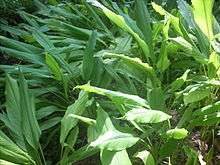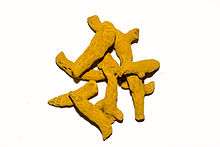turmeric
English

Turmeric (Curcuma longa)

Processed turmeric rhizomes
Etymology
From Middle English turmeryte, tarmaret, of uncertain origin. Possibly from Old French terre mérite (“deserving earth”). According to Klein, possibly corrupted from Arabic كركم (“Curcuma”).
Pronunciation
Noun
turmeric (countable and uncountable, plural turmerics)
- (botany) An Indian plant, Curcuma longa, with aromatic rhizomes, part of the ginger family (Zingiberaceae).
- (cooking) The pulverized rhizome of the turmeric plant, used for flavoring and to add a bright yellow color to food.
- Synonym: haldi
- A yellow to reddish-brown dye extracted from the turmeric plant.
- Synonym: E100
- turmeric colour:
Derived terms
Derived terms
- turmeric acid
- turmeric paper
- turmeric root
- wild turmeric
Translations
plant
|
|
spice
|
|
dye
|
References
- “termerite (n.)” in MED Online, Ann Arbor, Mich.: University of Michigan, 2007, retrieved 2018-07-25.
- Klein, Dr. Ernest, A Comprehensive Etymological Dictionary of the English Language, Amsterdam: Elsevier Scientific Publishing Co., 1971.
Further reading
- turmeric at OneLook Dictionary Search


This article is issued from
Wiktionary.
The text is licensed under Creative
Commons - Attribution - Sharealike.
Additional terms may apply for the media files.